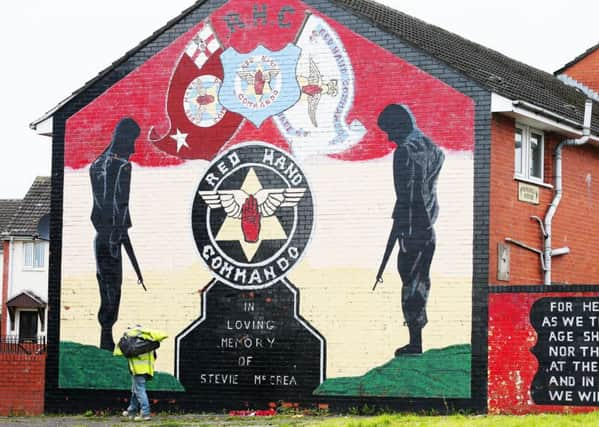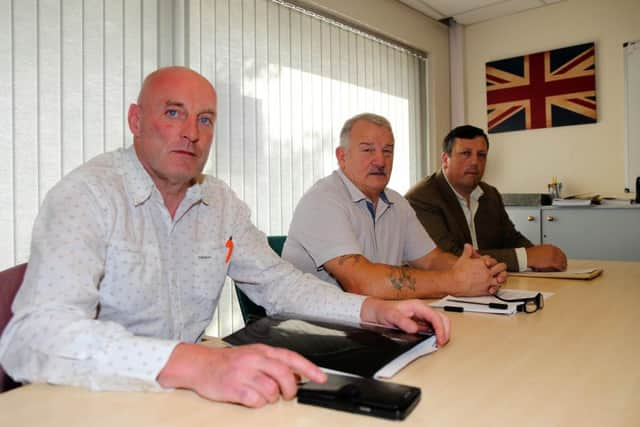Victims' dismay at application to legalise terror group


Yesterday there was little explicit political support in Northern Ireland for the proposal from the Red Hand Commando (RHC) group to the Home Secretary to be deproscribed, although the decision will ultimately be taken by the government or, potentially, by the courts.
Only the leader of the RHC-linked PUP, Billy Hutchinson, fully endorsed the proposal. He acknowledged that it was not what everyone wanted but was “a step in the right direction” which could be positive.
Advertisement
Hide AdAdvertisement
Hide AdOn Monday, members of the banned terrorist group – which says that it has not been active in any terrorism or other criminality for more than a decade – echoed the words of former UVF leader Gusty Spence, “offering true and abject remorse to all the innocent victims of the conflict”.


If successful, the application could be first could be the first of a series of such requests to allow former terrorist groups to operate openly.
But Alan Brecknell, who was only seven when two RHC gunmen burst into a Silverbridge pub and murdered his father Trevor and two others, was one of several victims to yesterday condemn the move. He told the News Letter that the RHC name was “soaked in blood and brings back so much heartache and pain for so many people”.
Sandra Peake, chief executive of the Wave Trauma Centre which works to support many Troubles victims, said that the bereaved and injured victims of the RHC would be hurt to the core by any suggestion ex-terrorists from the group should now have their “place in the sun”, as former RHC prisoner Jim Wilson yesterday described it.
Advertisement
Hide AdAdvertisement
Hide AdMs Peake said: “Why do they need to change? Why cannot they go away?


“Why do they need to remain in place? A bigger service for the victims and survivors would be for them to disband.”
“Former paramilitaries wanting a place in the sun will hurt to the core for some people as they are living in the shadow of that bereavement and injury, not only were they grievously impacted, but they continue to be with the use of that language.”
She said everybody agreed that paramilitaries needed to disappear off-stage.
Advertisement
Hide AdAdvertisement
Hide AdBut it is two years since the Fresh Start Agreement of November 2015 at Stormont which was supposed to provide greater support for Troubles victims.
Ms Peake added: “The only initiative from Fresh Start was a package on paramilitaries yet we have the injured pension (campaign) and none of the legacy institutions up and running.
“Messages such as today’s brings that very sharply into focus and people continue to struggle with what has happened without meaningful redress.
“Injured people are still waiting on a pension to support their practical and financial needs and bereaved families are waiting on the legacy institutions to be put in place.”
Advertisement
Hide AdAdvertisement
Hide AdThe RHC organisation was heavily linked with the much larger UVF.
In an interview with the News Letter on Monday when they made the announcement, members of the RHC declined to even estimate how many members they now have but yesterday some sources suggested that the RHC is a very small group.
In unionist political circles, the first and clearest unionist reaction was from the TUV leader Jim Allister, who said that the proposal should be “rejected by all right thinking people”, adding: “Disbandment, not legalisation, is the response of genuine remorse.”
Last night the DUP leader, Arlene Foster, appeared to strike a neutral tone on the question of deproscription, saying that it was a matter for the government, but emphasising the impact of such an application on victims of terrorism.
Advertisement
Hide AdAdvertisement
Hide AdShe said: “The DUP will work with those who wish to move away from paramilitary activity and build a better Northern Ireland.
“There is no place for paramilitary organisations in our society.
“It will be for the government to make an assessment of this group’s application to be de-proscribed, but we must always be mindful of how such initiatives impact upon victims who have suffered at the hands of terrorists in Northern Ireland.”
The UUP – whose former chairman David Campbell played a key role in working with the RHC on the application – issued a similarly nuanced response to the development, saying: “In the year 2017, there is absolutely no reason for paramilitary organisations to exist in any shape or form, proscribed or otherwise, but because individuals have a past doesn’t mean they can’t have a future.
Advertisement
Hide AdAdvertisement
Hide Ad“We will work with those who have moved away from paramilitarism and criminality.”
But yesterday there was support for the deproscription bid from nationalist commentator Brian Feeney.
The former SDLP councillor told Talkback: “I think that all the organisations should be deproscribed – I’ve said this before – for a number of reasons. It doesn’t work, for a start-off.
“It’s part of the hypocrisy in this society that every Sunday you can read in a newspaper the names of senior figures in the UDA and the UVF.
Advertisement
Hide AdAdvertisement
Hide Ad“Everyone knows who the leaders are; no one has been charged; no one has been convicted of being a member of the UDA or the UVF or IRA for years.”
Mr Feeney said that he would still like to see dissident republicans who are active in terrorism to remain proscribed.
In Monday’s statement announcing its bid for deproscription, the RHC implicitly defended its role during the Troubles and presented itself as having played a role in securing Northern Ireland’s place within the Union, saying that its members had played a role in “helping to secure the constitutional position of Northern Ireland within the United Kingdom”.